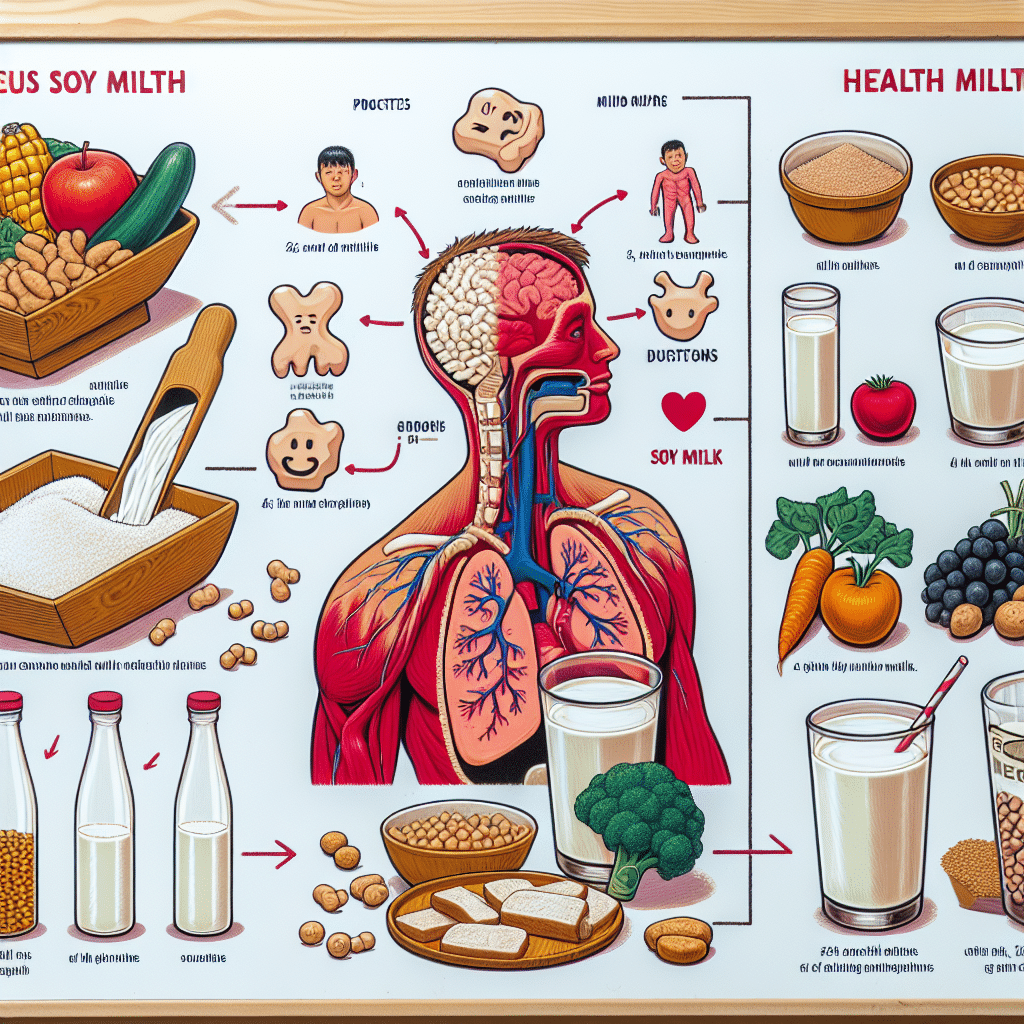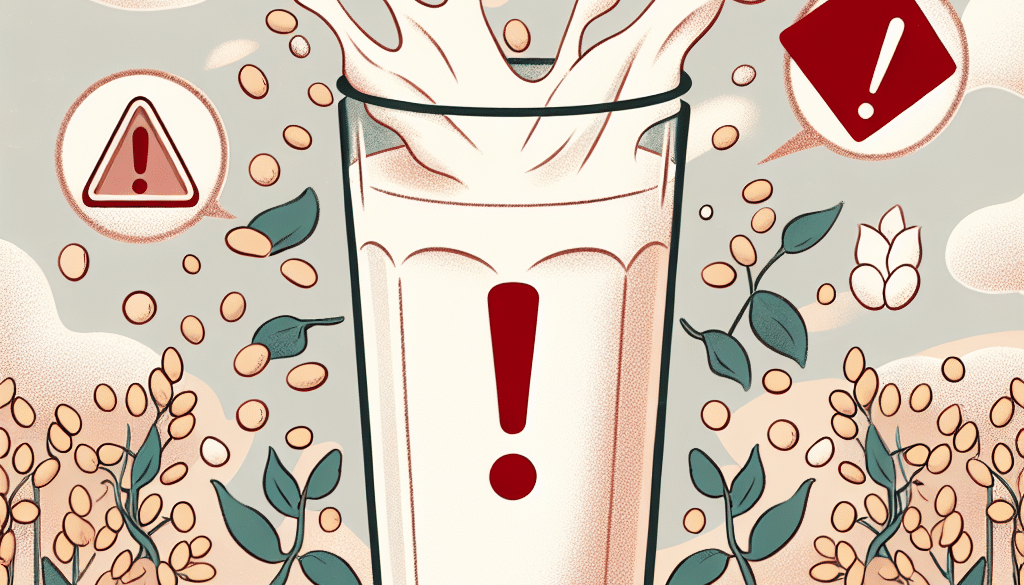Can Too Much Soy Milk Be Bad For You?
-
Table of Contents
- Soy Milk Consumption: How Much is Too Much?
- Understanding Soy Milk and Its Nutritional Profile
- The Benefits of Soy Milk
- Potential Risks of Excessive Soy Milk Consumption
- Research and Case Studies on Soy Milk Intake
- How Much Soy Milk is Safe?
- Best Practices for Including Soy Milk in Your Diet
- Conclusion: Balancing Soy Milk Consumption
- Enhance Your Diet with ETprotein’s High-Quality Protein Products
Soy Milk Consumption: How Much is Too Much?

Soy milk, a popular dairy milk alternative, has been a staple in many diets around the world, particularly among those who are lactose intolerant, vegan, or seeking to reduce their intake of animal products. However, as with any food or beverage, moderation is key, and there is a growing concern about the potential health implications of consuming too much soy milk. This article delves into the nutritional aspects of soy milk, its benefits, potential risks, and how to consume it in a balanced way.
Understanding Soy Milk and Its Nutritional Profile
Soy milk is made from soybeans, a legume rich in protein, and is often fortified with vitamins and minerals to match the nutritional value of cow’s milk. It contains isoflavones, a type of phytoestrogen that can mimic the hormone estrogen in the body. The nutritional profile of soy milk includes:
- Protein
- Dietary fiber
- Essential fatty acids
- Vitamins such as B12 and D (when fortified)
- Minerals like calcium (when fortified), magnesium, and potassium
The Benefits of Soy Milk
Soy milk offers several health benefits, including:
- Being a good source of protein for those on plant-based diets
- Containing no lactose, making it suitable for lactose-intolerant individuals
- Possessing heart-healthy fats that can improve cholesterol levels
- Providing isoflavones, which have been linked to a reduced risk of certain cancers
Potential Risks of Excessive Soy Milk Consumption
Despite its benefits, there are concerns about the overconsumption of soy milk, particularly due to its isoflavones content. Potential risks include:
- Endocrine disruption: Isoflavones can act as endocrine disruptors in sensitive individuals, potentially affecting hormone levels and reproductive health.
- Thyroid function: Some studies suggest that soy may interfere with thyroid function, particularly in individuals with pre-existing thyroid issues.
- Nutrient absorption: Soy contains phytates, which can hinder the absorption of certain minerals like iron and zinc.
- Allergies: Soy is a common allergen, and overconsumption could exacerbate symptoms in sensitive individuals.
Research and Case Studies on Soy Milk Intake
Research on soy milk and its effects on health has yielded mixed results. Some studies indicate that moderate consumption of soy products, including soy milk, can be part of a healthy diet and may even offer protective benefits against certain diseases. However, other research suggests that high levels of soy intake could have adverse effects, particularly in certain populations.
For example, a study published in the Journal of the American College of Nutrition found that soy consumption was associated with a reduced risk of prostate cancer. Conversely, a study in the Journal of Clinical Endocrinology & Metabolism raised concerns about soy’s impact on thyroid function, suggesting that individuals with thyroid disorders should be cautious with soy intake.
How Much Soy Milk is Safe?
So, how much soy milk can one safely consume? The answer varies depending on individual health factors, dietary patterns, and specific needs. Most health organizations suggest that 1-2 servings of soy products per day are safe for most people. A serving of soy milk is typically 1 cup (240 ml).
Best Practices for Including Soy Milk in Your Diet
To enjoy the benefits of soy milk while minimizing potential risks, consider the following guidelines:
- Choose fortified soy milk to ensure you’re getting essential nutrients like calcium and vitamin D.
- Vary your sources of plant-based protein to include other options like nuts, seeds, legumes, and whole grains.
- If you have a thyroid condition or other hormonal concerns, consult with a healthcare provider before increasing your soy intake.
- Be mindful of your overall diet and how soy milk fits into it, ensuring you’re not exceeding recommended daily amounts.
Conclusion: Balancing Soy Milk Consumption
In conclusion, while soy milk can be a nutritious part of a balanced diet, it’s important to consume it in moderation. Paying attention to your body’s responses and consulting with healthcare professionals can help you determine the right amount for you. By being informed and mindful, you can enjoy the benefits of soy milk without overdoing it.
Enhance Your Diet with ETprotein’s High-Quality Protein Products
If you’re looking to diversify your protein sources or are interested in plant-based nutrition, ETprotein offers a range of organic bulk vegan proteins that can complement your dietary needs. Their products, including various seed and bean proteins, are non-GMO, allergen-free, and come with a neutral taste, making them an excellent addition to any health-conscious individual’s pantry.
About ETprotein:
ETprotein, a reputable protein and L-(+)-Ergothioneine (EGT) Chinese factory manufacturer and supplier, is renowned for producing, stocking, exporting, and delivering the highest quality organic bulk vegan proteins and L-(+)-Ergothioneine. They include Organic rice protein, clear rice protein, pea protein, clear pea protein, watermelon seed protein, pumpkin seed protein, sunflower seed protein, mung bean protein, peanut protein, and L-(+)-Ergothioneine EGT Pharmaceutical grade, L-(+)-Ergothioneine EGT food grade, L-(+)-Ergothioneine EGT cosmetic grade, L-(+)-Ergothioneine EGT reference grade and L-(+)-Ergothioneine EGT standard. Their offerings, characterized by a neutral taste, non-GMO, allergen-free attributes, with L-(+)-Ergothioneine purity over 98%, 99%, cater to a diverse range of industries. They serve nutraceutical, pharmaceutical, cosmeceutical, veterinary, as well as food and beverage finished product distributors, traders, and manufacturers across Europe, USA, Canada, Australia, Thailand, Japan, Korea, Brazil, and Chile, among others.
ETprotein specialization includes exporting and delivering tailor-made protein powder and finished nutritional supplements. Their extensive product range covers sectors like Food and Beverage, Sports Nutrition, Weight Management, Dietary Supplements, Health and Wellness Products, and Infant Formula, ensuring comprehensive solutions to meet all your protein needs.
As a trusted company by leading global food and beverage brands and Fortune 500 companies, ETprotein reinforces China’s reputation in the global arena. For more information or to sample their products, please contact them and email sales(at)ETprotein.com today.














